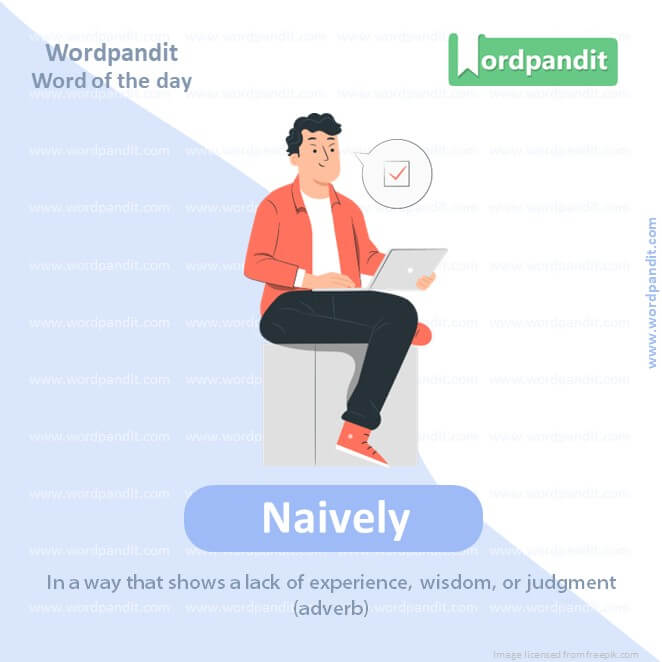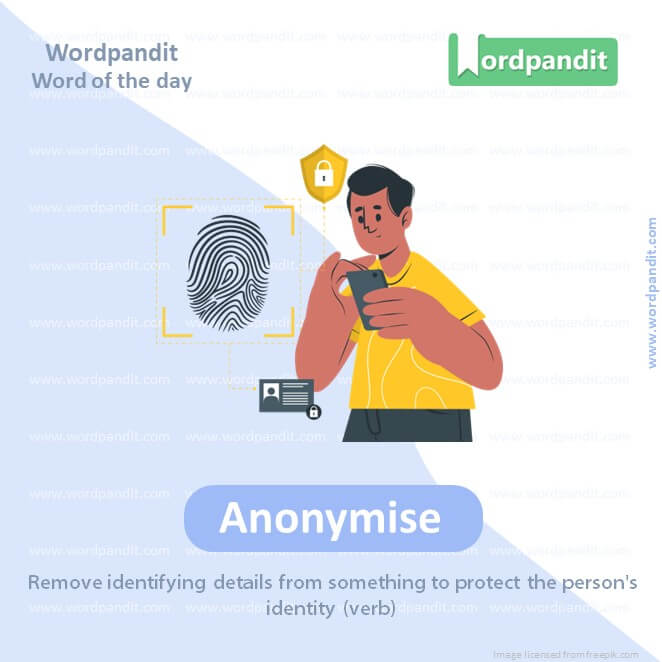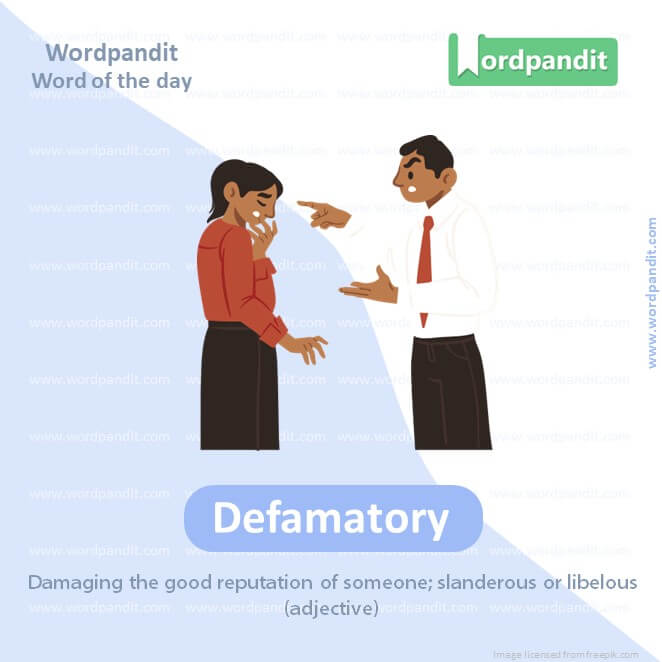Daily Vocabulary Words: List of Daily Used Words in Leading Indian Newspapers
Hi there. Welcome to this special section @ Wordpandit. Our endeavour here is straightforward: highlighting daily vocabulary words that you would come across in leading newspapers in the country. We have included the following newspapers in our selection:
• The Times of India
• The Economic Times
• Hindustan Times
• Mint
• Indian Express
We are putting in extensive work to develop your vocabulary. All you have to do is be regular with this section and check out this post daily. This is your repository of commonly used words; essentially, we are posting a list of daily used words. Hence, this has significant practical application as it teaches you words that are commonly used in leading publications mentioned above.
Visit the website daily to learn words from leading Indian newspapers.

WORD-1: Naively
CONTEXT: It is often somewhat naively argued that air pollution is a great leveller, affecting the rich and the poor alike since everyone breathes the same air.
SOURCE: Indian Express
EXPLANATORY PARAGRAPH: Imagine you believe that every cat you see is just a fluffy friend who wants to cuddle, without thinking some might scratch. That’s being naively — you’re sweetly simple and not thinking about the bad stuff.
MEANING: In a way that shows a lack of experience, wisdom, or judgment (adverb).
PRONUNCIATION: nye-eve-lee
SYNONYMS: innocently, simply, unsophisticatedly, trustingly, gullibly
USAGE EXAMPLE:
1. She naively believed that the wild animals would not harm her.
2. He naively agreed to the terms without reading them.
3. They were naively optimistic about the success of the project.
4. The child naively told the stranger their home address.

WORD-2: Stringent
CONTEXT: This explains the need to evolve more stringent air quality standards and find ways to implement those.
SOURCE: Hindustan Times
EXPLANATORY PARAGRAPH: Think of the tightest, most secure knot you can tie. Stringent is like that knot but for rules, which means they are very, very strict and you have to follow them exactly.
MEANING: Strict, precise, and exacting (adjective).
PRONUNCIATION: strin-jent
SYNONYMS: strict, rigid, rigorous, severe, harsh
USAGE EXAMPLE:
1. The school has stringent rules against bullying.
2. Stringent safety regulations were enforced at the construction site.
3. She followed a stringent diet to improve her health.
4. The government introduced more stringent laws on pollution.

WORD-3: Impersonate
CONTEXT: It may be used to generate fake videos, it can also be used to impersonate friends or loved ones to trick individuals into sending money to scammers.
SOURCE: Hindustan Times
EXPLANATORY PARAGRAPH: It’s like when you dress up and act like a superhero, pretending to be them, using your voice and actions to make believe you’re that character.
MEANING: Pretend to be (someone else) for entertainment or fraud (verb).
PRONUNCIATION: im-pur-suh-nate
SYNONYMS: mimic, imitate, copy, impersonify, parody
USAGE EXAMPLE:
1. He was arrested for trying to impersonate a police officer.
2. At the party, she decided to impersonate her favorite pop star.
3. It’s illegal to impersonate a doctor.
4. The comedian is famous for his ability to impersonate celebrities.

WORD-4: Anonymise
CONTEXT: there may also be legitimate uses for the underlying technology — for instance, to anonymise the voices and faces of journalists and help them remain safe in oppressive regimes.
SOURCE: Times of India
EXPLANATORY PARAGRAPH: Imagine if you wrote a story and took your name off it so no one knew you wrote it. That’s anonymising — making something so no one knows who it’s from.
MEANING: Remove identifying details from something to protect the person’s identity (verb).
PRONUNCIATION: uh-non-uh-mize
SYNONYMS: de-identify, conceal, disguise, anonymize, mask
USAGE EXAMPLE:
1. Personal data should be anonymised before sharing it in a report.
2. Anonymising questionnaires helps to ensure participants’ privacy.
3. The app anonymises the feedback to encourage honesty.
4. Researchers often anonymise their data to protect their subjects.

WORD-5: Defamatory
CONTEXT: it is unclear whether the video would be considered obscene, defamatory or merely a satirical impersonation.
SOURCE: Times of India
EXPLANATORY PARAGRAPH: If someone says a mean, untrue thing about you to make others not like you, that’s defamatory. It’s like telling a lie about someone to be hurtful.
MEANING: Damaging the good reputation of someone; slanderous or libelous (adjective).
PRONUNCIATION: dih-fam-uh-tor-ee
SYNONYMS: slanderous, libelous, derogatory, disparaging, pejorative
USAGE EXAMPLE:
1. The article was defamatory and caused harm to his reputation.
2. She sued the newspaper for making defamatory statements about her.
3. Publishing defamatory comments online can lead to legal action.
4. The politician faced a defamatory campaign by his opponents.
WORD-6: Presumably
CONTEXT: Presumably, undertaking some kind of content moderation efforts would satisfy this requirement, meaning that most of the large social media platforms would be in compliance.
SOURCE: Indian Express
EXPLANATORY PARAGRAPH: When you guess something because it seems likely, like thinking there must be a game today because you see a soccer ball, that’s presumably. It’s what you think is true.
MEANING: Used to convey that what is asserted is very likely though not known for certain (adverb).
PRONUNCIATION: pri-zoo-muh-blee
SYNONYMS: probably, likely, presumably, seemingly, ostensibly
USAGE EXAMPLE:
1. Presumably, she’s not coming to the party since she hasn’t replied.
2. The keys are not here, so presumably, someone took them.
3. Presumably, the meeting will end by five o’clock.
4. They can presumably afford the car if they’re willing to spend that much.
WORD-7: Complying
CONTEXT: This is important because the consequence of not complying with these rules could potentially make the platforms liable for such content.
SOURCE: Indian Express
EXPLANATORY PARAGRAPH: Complying is like when you follow the rules or do what you’re told, like cleaning your room when your parents ask.
MEANING: Acting in accordance with a wish or command (verb).
PRONUNCIATION: kuhm-ply-ing
SYNONYMS: obeying, following, observing, adhering, conforming
USAGE EXAMPLE:
1. They were complying with the regulations set by the committee.
2. Complying with the safety protocols is mandatory for all workers.
3. By complying with the doctor’s orders, he recovered quickly.
4. The company is complying with environmental laws.
WORD-8: Retrograde
CONTEXT: Several gaming companies will close because of the retrograde levy of 28 per cent on the gross amount.
SOURCE: Hindustan Times
EXPLANATORY PARAGRAPH: Imagine walking backwards instead of forwards; that’s like retrograde. It means going backward or becoming worse, like when your video game level goes down instead of up.
MEANING: Moving backward or returning to an earlier or worse state (adjective).
PRONUNCIATION: ret-ruh-grade
SYNONYMS: regressive, backward, reverting, declining, deteriorating
USAGE EXAMPLE:
1. The patient’s condition took a retrograde turn overnight.
2. The new policy is a retrograde step for the community.
3. In retrograde motion, the planet appears to move backward.
4. Some argue that censorship is a retrograde action against freedom.
WORD-9: Exchequer
CONTEXT: the CAG report on the 2G scam famously claimed that the loss to the public exchequer was Rs 1.76 lakh crore.
SOURCE: Hindustan Times
EXPLANATORY PARAGRAPH: Think of a giant piggy bank where a country keeps all its money; that’s the exchequer. It’s where the government’s money is managed.
MEANING: The funds or revenue of a government, corporation, or institution (noun).
PRONUNCIATION: eks-chek-er
SYNONYMS: treasury, finances, funds, coffers, fiscal department
USAGE EXAMPLE:
1. The exchequer was depleted after the costly infrastructure projects.
2. Tax increases were necessary to refill the exchequer.
3. The Chancellor of the Exchequer presented the annual budget.
4. Mismanagement of the exchequer can lead to an economic crisis.
WORD-10: Preponderantly
CONTEXT: the Supreme Court held that rummy is preponderantly a game of skill, and in Junglee games, the Madras High Court held that poker is a game of skill.
SOURCE: Times of India
EXPLANATORY PARAGRAPH: Imagine a group of ten kids, and seven of them have red hats. Preponderantly means mostly or mainly, like how most kids there have red hats.
MEANING: Predominantly, mostly, or primarily (adverb).
PRONUNCIATION: pre-pon-duh-rant-lee
SYNONYMS: predominantly, mainly, chiefly, largely, primarily
USAGE EXAMPLE:
1. The population of the town is preponderantly elderly.
2. The evidence was preponderantly in favor of the defendant.
3. Preponderantly, the feedback about the new show was positive.
4. Her wardrobe is preponderantly filled with shades of blue.
vocabulary pronounce
The art of communication opens up a world of opportunities. However, to glide smoothly through this realm, it is crucial to not only understand the ‘vocabulary pronounce’ but also to exercise precision when using it. The task of acquiring a rich vocabulary and impeccable pronunciation might seem daunting, but there are proficient ways to conquer this hurdle.
While individuals may have a vast vocabulary, it is the ‘vocabulary pronounce’ that truly dictates the overall clarity and comprehension of their messages. Pronunciation is the essence that brings the words, the bricks in the wall of language, to life. Hence, learning proper pronunciation is vital for anyone aiming to achieve excellence in any language.
When delving into ‘vocabulary pronounce’, one should adopt an interactive and immersive approach rather than a theoretical one. Listening and practicing are pillars to gain command over the ‘vocabulary pronounce’. A balance of both can go a long way in improvising and refining one’s language skills. So, it’s advisable to regularly listen to podcasts or watch videos featuring native speakers. These mediums are a treasure trove of right pronunciation, intonation, and pause.
An excellent way to approach learning ‘vocabulary pronounce’ is also to break down complicated or lengthier words into smaller, manageable bits. By doing this, each syllable can be enunciated accurately, promoting correct pronunciation. This technique can significantly reduce the intimidation of difficult words and enhance a learner’s confidence and fluency.
Remember, ‘vocabulary pronounce’ is a lifelong journey and not a destination. Hence, investing time for consistent practicing, learning new words, and understanding their correct pronunciation should be part and parcel of one’s daily routine. Technology, with its various apps and programs, is a helpful ally in this quest.
To conclude, understanding and mastering ‘vocabulary pronounce’ are indeed challenging feats but with the right strategies and diligent practice, they are readily achievable, leading to robust language skills and heightened communication abilities.












